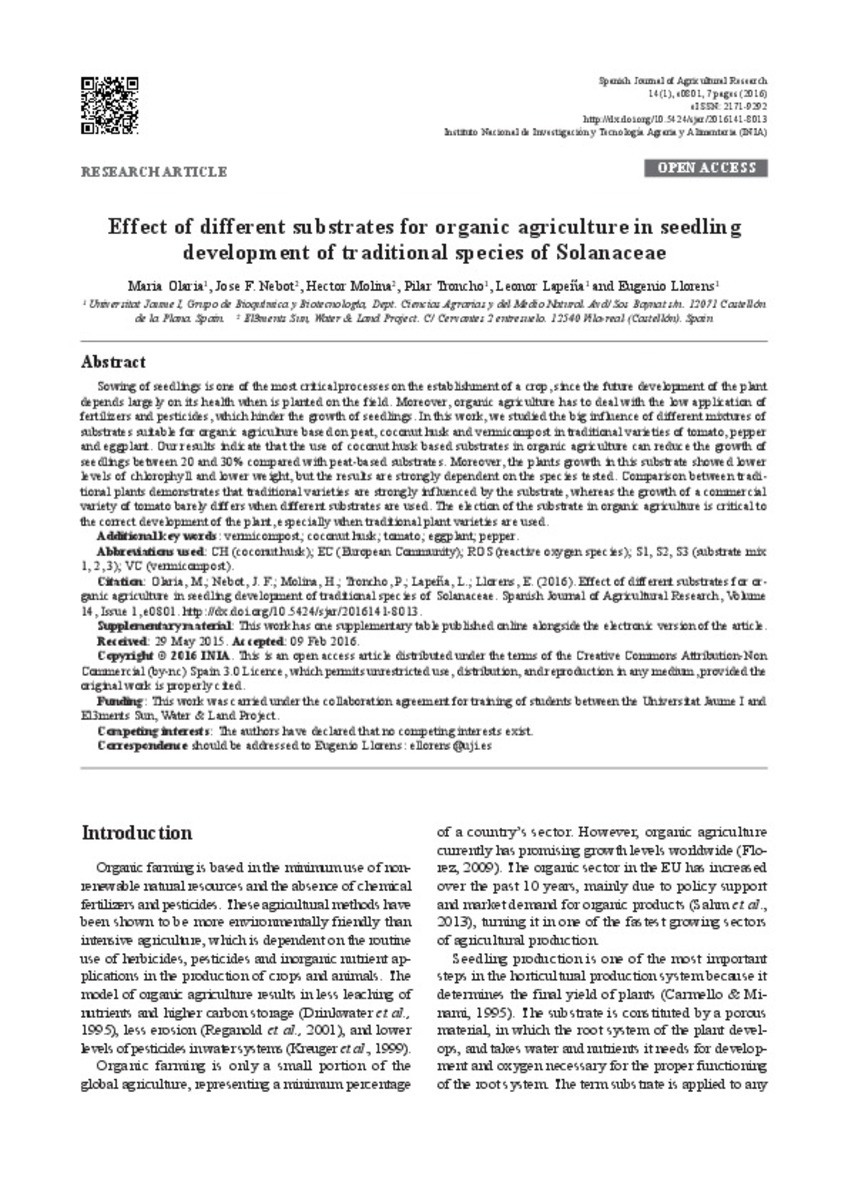Mostrar el registro sencillo del ítem
Effect of different substrates for organic agriculture in seedling development of traditional species of Solanaceae
| dc.contributor.author | Olaria Peris, María | |
| dc.contributor.author | Nebot, José F. | |
| dc.contributor.author | Molina, Hector | |
| dc.contributor.author | Troncho, Pilar | |
| dc.contributor.author | Lapeña, Leonor | |
| dc.contributor.author | Llorens, Eugenio | |
| dc.date.accessioned | 2017-06-27T19:02:58Z | |
| dc.date.available | 2017-06-27T19:02:58Z | |
| dc.date.issued | 2016 | |
| dc.identifier.citation | Olaria, M., Nebot, J. F., Molina, H., Troncho, P., Lapeña, L., & Llorens, E. (2016). Effect of different substrates for organic agriculture in seedling development of traditional species of Solanaceae. Spanish Journal of Agricultural Research, 14(1), 0801 | ca_CA |
| dc.identifier.issn | 1695-971X | |
| dc.identifier.uri | http://hdl.handle.net/10234/168120 | |
| dc.description.abstract | Sowing of seedlings is one of the most critical processes on the establishment of a crop, since the future development of the plant depends largely on its health when is planted on the field. Moreover, organic agriculture has to deal with the low application of fertilizers and pesticides, which hinder the growth of seedlings. In this work, we studied the big influence of different mixtures of substrates suitable for organic agriculture based on peat, coconut husk and vermicompost in traditional varieties of tomato, pepper and eggplant. Our results indicate that the use of coconut husk based substrates in organic agriculture can reduce the growth of seedlings between 20 and 30% compared with peat-based substrates. Moreover, the plants growth in this substrate showed lower levels of chlorophyll and lower weight, but the results are strongly dependent on the species tested. Comparison between traditional plants demonstrates that traditional varieties are strongly influenced by the substrate, whereas the growth of a commercial variety of tomato barely differs when different substrates are used. The election of the substrate in organic agriculture is critical to the correct development of the plant, especially when traditional plant varieties are used. | ca_CA |
| dc.description.sponsorShip | This work was carried under the collaboration agreement for training of students between the Universitat Jaume I and El3ments Sun, Water & Land Project. | ca_CA |
| dc.format.extent | 7 p. | ca_CA |
| dc.format.mimetype | application/pdf | ca_CA |
| dc.language.iso | eng | ca_CA |
| dc.publisher | Instituto Nacional de Investigación y Tecnología Agraria y Alimentaria (INIA) | ca_CA |
| dc.relation.isPartOf | Spanish Journal of Agricultural Research, 2016, vol. 14, núm. 1 | ca_CA |
| dc.rights | © 2016 INIA. This is an open access article distributed under the terms of the Creative Commons Attribution-Non Commercial (by-nc) Spain 4.0 Licence, which permits unrestricted use, distribution, and reproduction in any medium, provided the original work is properly cited. | ca_CA |
| dc.rights | Atribución 4.0 Internacional | * |
| dc.rights.uri | http://creativecommons.org/licenses/by-sa/4.0/ | * |
| dc.subject | Vermicompost | ca_CA |
| dc.subject | Coconut husk | ca_CA |
| dc.subject | Tomato | ca_CA |
| dc.subject | Eggplant | ca_CA |
| dc.subject | Pepper | ca_CA |
| dc.title | Effect of different substrates for organic agriculture in seedling development of traditional species of Solanaceae | ca_CA |
| dc.type | info:eu-repo/semantics/article | ca_CA |
| dc.identifier.doi | https://doi.org/10.5424/sjar/2016141-8013 | |
| dc.rights.accessRights | info:eu-repo/semantics/openAccess | ca_CA |
| dc.relation.publisherVersion | http://revistas.inia.es/index.php/sjar/article/view/8013 | ca_CA |
Ficheros en el ítem
Este ítem aparece en la(s) siguiente(s) colección(ones)
-
CAMN_Articles [566]
Excepto si se señala otra cosa, la licencia del ítem se describe como: © 2016 INIA. This is an open access article distributed under the terms of the Creative Commons Attribution-Non
Commercial (by-nc) Spain 4.0 Licence, which permits unrestricted use, distribution, and reproduction in any medium, provided the
original work is properly cited.








